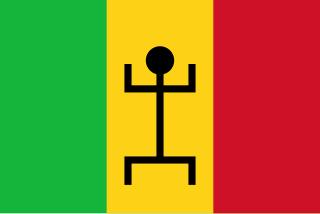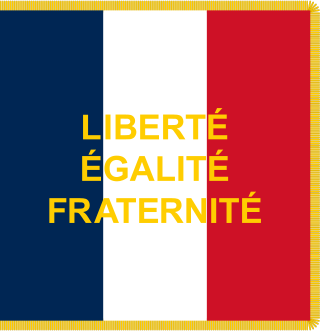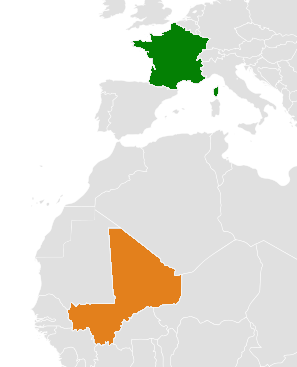
The member states of the United Nations comprise 193 sovereign states. The United Nations (UN) is the world's largest intergovernmental organization. All members have equal representation in the UN General Assembly.

The Mali Federation was a federation in West Africa linking the French colonies of Senegal and the Sudanese Republic for two months in 1960. It was founded on 4 April 1959 as a territory with self-rule within the French Community and became independent after negotiations with France on 20 June 1960. Two months later, on 19 August 1960, the Sudanese Republic leaders in the Mali Federation mobilized the army, and Senegal leaders in the federation retaliated by mobilizing the gendarmerie ; this resulted in a tense stand-off, and led to the withdrawal from the federation by Senegal the next day. The Sudanese Republic officials resisted this dissolution, cut off diplomatic relations with Senegal, and defiantly changed the name of their country to Mali. For the brief existence of the Mali Federation, the premier was Modibo Keïta, who would later become the first President of Mali, and its government was based in Dakar, the eventual capital of Senegal.

The Russian Federation continued to use the Soviet Union's seat, including its permanent membership on the Security Council in the United Nations after the 1991 dissolution of the Soviet Union, which originally co-founded the UN in 1945. The continuity was supported by the USSR's former members and was not objected to by the UN membership; Russia accounted for more than 75% of the Soviet Union's economy, the majority of its population and 75% of its land mass; in addition, the history of the Soviet Union began in Russia with the October Revolution in 1917 in Petrograd. If there was to be a continuator to the Soviet seat on the Security Council among the former Soviet republics, these factors made Russia seem a logical choice.

The French Community was the constitutional organization set up in October 1958 between France and its remaining African colonies, then in the process of decolonization. It replaced the French Union, which had reorganized the colonial empire in 1946. While the Community remained formally in existence until 1995, when the French Parliament officially abolished it, it had effectively ceased to exist and function by the end of 1960, by which time all the African members had declared their independence and left it.

The United Nations Mission in East Timor (UNAMET) was established by Security Council Resolution 1246 on 11 June 1999 for a period up to 31 August 1999. By Security Council Resolution 1257 of 3 August UNAMET was extended to 30 September 1999.
United Nations Security Council Resolution 133, adopted unanimously on January 26, 1960, after examining the application of the Republic of Cameroon for membership in the United Nations, the Council recommended to the General Assembly that the Republic of Cameroon be admitted.
United Nations Security Council Resolution 139 was adopted unanimously on June 28, 1960. After examining the application of the Federation of Mali for membership in the United Nations, the Council recommended to the General Assembly that the Federation of Mali be admitted.
United Nations Security Council Resolution 152, adopted on August 23, 1960, after examining the application of the Republic of the Congo for membership in the United Nations the Council recommended to the General Assembly that the Republic of the Congo be admitted.
United Nations Security Council Resolution 159, adopted unanimously on September 28, 1960, after examining the application of the Republic of Mali for membership in the United Nations the Council recommended to the General Assembly that the Republic of Mali be admitted.
United Nations Security Council Resolution 160, adopted on October 7, 1960, after examining the application of the Federation of Nigeria for membership in the United Nations the Council recommended to the General Assembly that the Federation of Nigeria be admitted.

The United Nations Mission in the Central African Republic and Chad (MINURCAT) was a United Nations peacekeeping mission established by the United Nations Security Council on September 25, 2007 to provide a multidimensional presence of up to 350 police and military personnel to eastern Chad and north-eastern Central African Republic

United Nations Security Council resolution 1125, adopted unanimously on 6 August 1997, after expressing concern at the situation facing the Central African Republic, the Council authorised the continuation of the Inter-African Mission to Monitor the Implementation of the Bangui Agreements (MISAB) mission in the country for a further three months.

United Nations Security Council resolution 1350, adopted unanimously on 27 April 2001, after recalling resolutions 808 (1993), 827 (1993), 1166 (1998) and 1329 (2000), the Council forwarded a list of nominees for permanent judges at the International Criminal Tribunal for the former Yugoslavia (ICTY) to the General Assembly for consideration.

United Nations Security Council resolution 1449, adopted unanimously on 13 December 2002, after recalling resolutions 955 (1994), 1165 (1998), 1329 (2000), 1411 (2002) and 1431 (2002), the Council forwarded a list of nominees for permanent judges at the International Criminal Tribunal for Rwanda (ICTR) to the General Assembly for consideration.

The United Nations Supervision Mission in Syria (UNSMIS) was a United Nations peacekeeping mission in Syria, set up in 2012 as a result of United Nations Security Council Resolution 2043 in response to the Syrian Civil War. It was commanded by Norwegian Major General Robert Mood until 20 July 2012 followed by Lieutenant General Babacar Gaye from Senegal. Although observers remain in the country, Mood suspended their mission on June 16, 2012, citing "escalating violence". Observers will conduct no further patrols and stay in their current positions until the suspension is lifted. On 20 July 2012, the Security Council extended UNSMIS for a final period of 30 days. According to resolution 2059, the Council would only consider more extensions in the event that the Secretary-General reports and the Security Council confirms the cessation of the use of heavy weapons and a reduction in the level of violence sufficient by all sides to allow UNSMIS to implement its mandate.

France and Senegal are both full members of the Organisation internationale de la Francophonie, and the United Nations.

The United Nations Mission in the Central African Republic, more commonly known as MINURCA was a United Nations peacekeeping force in the Central African Republic. The 1350-troop mission was established by the United Nations Security Council Resolution 1159 in March 1998. It was replaced in 2000 after the Central African Republic conducted two peaceful elections, with the entirely civilian composed UN Peace-Building Support Office in the Central African Republic (BONUCA).

France–Mali relations are the current and historical relations between France and Mali.









